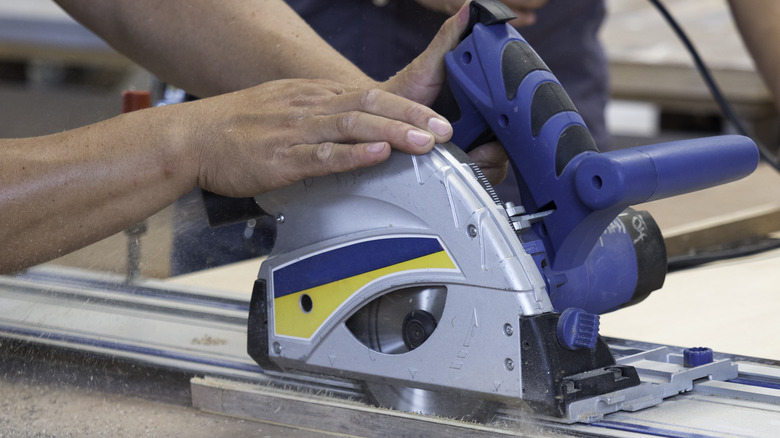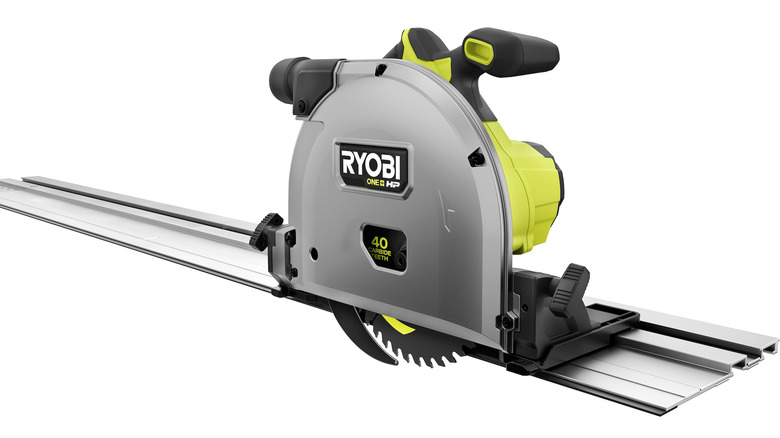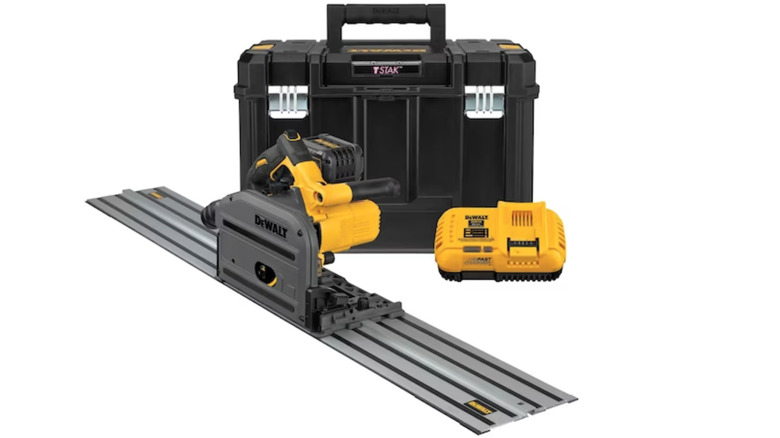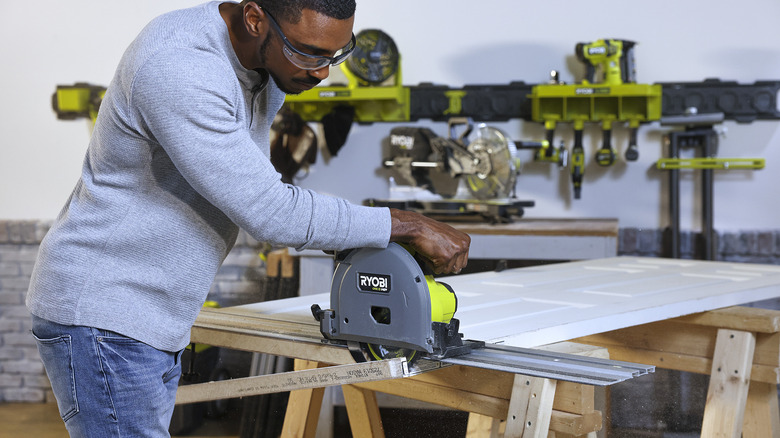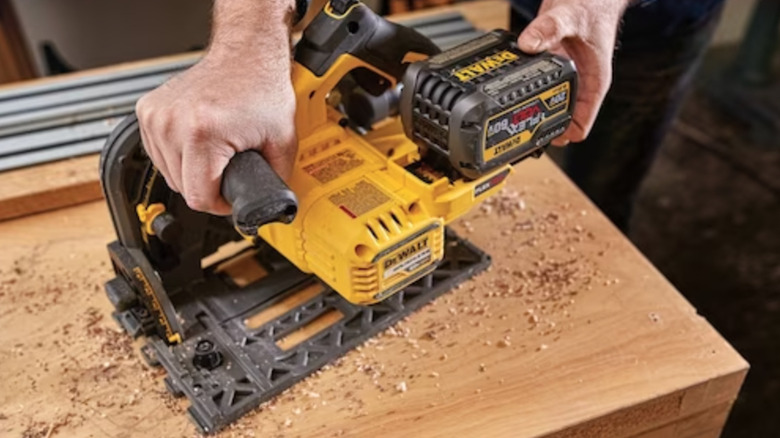Ryobi's ONE+ Vs. DeWalt's Flexvolt 6-1/2" Track Saw: How Do They Compare?
We may receive a commission on purchases made from links.
You might pride yourself on your woodworking skills and be pretty handy with a handheld circular saw, but when it comes time to make long, straight cuts that need to be accurate down to the millimeter, you should never take any chances. One slightly-off cut could ruin an entire project, which is why you should equip yourself with a track saw. You may already know this and have already decided to add one to your tool collection. You may have even narrowed it down to two popular options: Ryobi's 18V ONE+ HP Brushless 6.5-inch Track Saw and DeWalt's Flexvolt 60V Max 6.5-inch Cordless Track saw. But how do they compare, and which one is right for you?
Both perform have similar functions and are useful for making straight, smooth cuts into large pieces of material like plywood or fiberboard, or making plunge cuts and clean cuts for trim work and finishing projects. However, they also have enough differences that warrant a closer look. For one thing, in its branding, Ryobi uses two words and calls its product a "track saw," while DeWalt uses one word for its tool. Obviously, though, the differences go deeper than that, and you shouldn't assume that just because DeWalt sits high on SlashGear's list of every major power tool brand ranked, its track saw is superior — while its tools are generally high-quality, you should never take any individual product for granted. Here's a closer look at the similarities and differences between the track saws manufactured by Ryobi and DeWalt.
What is Ryobi's 18V ONE+ HP Brushless 6.5-inch Track Saw?
Ryobi tools are produced by Techtronic Industries (TTI), a Wisconsin-based company that also owns several other familiar brands, such as Milwaukee, Oreck, and Hoover. The brand sells a wide range of power tools and equipment, including many cordless saws and other great power tools for woodworking. The Ryobi 18V ONE+ HP Brushless 6.5-inch Track Saw is the only Ryobi track saw available in its line of products. As with most track saws, it's a handheld unit that pairs with a compatible track to allow for straight, smooth cuts, as well as plunge cuts that can be applied to the middle of a piece without starting from its edge.
The tool is also one of the most expensive Ryobi tools sold by the brand, and has a list price of $229. That price includes a riving knife, track clamp, track wrench, blade wrench, and a compatible 55-inch track (in two pieces), but it doesn't include an 18-volt battery or charger, which will cost extra. You can also buy additional tracks separately, if needed, for $79 each. If you're looking to buy the Ryobi track saw, it's available from the brand's online store. When it's in stock, you can also purchase it from Amazon for $259.99. Home Depot also currently sells the tool at its original, higher list price of $329.
What is Dewalt's Flexvolt 60V Max 6.5-inch Cordless Tracksaw?
If you somehow haven't heard of DeWalt, you've almost certainly heard of its parent company, Stanley Black & Decker, which has been making power tools for over 100 years. The brand's founder, Raymond DeWalt, pioneered the first radial arm saw, so its track saw is part of a long history of power cutting tools. Unlike Ryobi, DeWalt offers a 12-amp corded track saw in addition to its Flexvolt 60V Max 6.5-inch Cordless Tracksaw. A compatible track isn't necessarily included with the DeWalt cordless track saw, though you can purchase it bundled with the tool as part of a kit. As with Ryobi, you can also buy a kit that includes a battery and charger, though the tool can also be purchased just by itself.
At 59 inches, DeWalt's track is 4 inches longer than Ryobi's. However, the company also sells a shorter, 46-inch track that's useful if you've got a smaller workspace. Additionally, DeWalt offers several compatible accessories for its track saw, including track clamps, a T-square, a router adapter, and different types of blades, which makes the tool especially handy if you plan on using it for a wider range of applications.
By itself — with no track, accessories, or power supply — the DeWalt Flexvolt 60V Max 6.5-inch Cordless Tracksaw is available from Home Depot for $399, which is pricier than Ryobi's track saw. However, DeWalt's is a little easier to find and is sold by more retailers than the latter. You can also find it for the same price at Acme Tools, Burns Power Tools, and Amazon (when it's in stock), as well as at several other locations.
Which track saw has superior specs?
The brushless motor of the Ryobi track saw can deliver up to 4,300 RPM. With its default 40T carbide-tipped blade, the tool can make -1 to 48-degree bevel cuts, allowing you to cut at a range of different angles. It can also make precise score and plunge cuts; it has a 1-15-16-inch depth of cut capacity at 90 degrees (when using the track) and adjustable depth control switch and depth scale. Plus, you can also use its anti-tip and track adjustment features for smoother and more accurate work.
DeWalt's track saw has a slightly deeper depth of cut and is able to cut (on-track) hardwoods that are 2-1/8 inches thick at 90 degrees and 1-5/8 inches thick at 45 degrees. It can bevel to 47 degrees, which is just a one-degree difference with Ryobi's track saw. DeWalt's tool includes a convenient variable-speed dial and at its maximum it can generate up to 4,000 RPM, which is slightly less than Ryobi's tool. At its lowest setting, it can deliver 1,700 RPM.
The tool is also equipped with multiple safety features, including a riving knife and continuous anti-kickback mechanism, as well as a low-profile blade guard that makes it easier to operate the saw in confined spaces. Both products include 1.25-inch dust ports that can easily connect to most vacuums and other dust collectors. Ryobi also has a 1-⅞-inch port for added versatility, while DeWalt's dust port can swivel for more maneuverability.
Which track saw has a longer battery life?
One apparent difference you probably noticed right away between the two track saws is that they use different battery sizes — Ryobi's is powered by an 18-volt battery, while DeWalt's utilizes a much larger 60-volt pack. Despite Ryobi's track saw using a much smaller capacity, it doesn't detract from its performance, as the tool has a slightly higher maximum RPM than DeWalt's.
DeWalt's track saw may last a little longer though with its larger capacity battery. The company says its tool can cut 298 linear feet of 0.75-inch birch plywood before needing a recharge. According to a reviewer writing for Tools in Action, they were able to use the tool all day and only needed to recharge the 2 Ah battery at night. Ryobi, on the other hand, claims that its track saw can produce up to 260 linear feet of cutting per charge on a 4 Ah battery.
The fact that Ryobi uses a smaller battery has some other advantages. Its One+ system of 18V products allows you to use the same charger and batteries interchangeably for over 300 different devices, including all kinds of power tools, as well as appliances such as fans, lights, and Bluetooth radios. There are far less cordless tools that require the much larger 60V battery used in DeWalt's similar Flexvolt system, and they're also more expensive, since they're more heavy duty. If cost is a concern, Ryobi's 18V batteries — despite being smaller — are similarly priced to DeWalt's 60V units, though its charger is more affordable.
Which track saw has better reviews?
A good metric for whether a tool works as advertised is by checking out reviews of customers who've actually purchased and used it. DeWalt's track saw has an average 4.7 out of five score on both Home Depot's and its own website. The Ryobi track saw has a 4.6 user rating on the brand's website, but a lower score on Home Depot's — 3.8 out of five. However, these scores are averaged from a fairly small sample size, which makes them somewhat unreliable. That's why it's a good idea to also look at professional reviews of the tools that are based on hands-on experience.
Popular Woodworking called Ryobi's tool a "perfectly average saw with a truly outstanding track," but praised its value, saying that there's, "not a comparable saw on the market at that price point." On the other hand, Pro Tool Reviews gave the Ryobi track saw a stellar review and an impressive score of 9.5 out of 10, saying it's "easy to use" and has "excellent cut quality and precision."
Pro Tool Reviews also gave a good review to DeWalt's product, with a slightly lower rating of 9.1 out of 10. While the publication had some issues with Ryobi's dust collection, it called DeWalt's "excellent." It also praised the latter's cutting, calling it "incredibly accurate," though noted that it could take some time for you to "get acclimated to the straight plunge mechanism which you push instead of pull down as you might have done with other plunge or track saws." Tools in Action gave DeWalt's saw an even stronger review, rating it 4.9 out of 5 and giving it perfect scores for performance, quality, and features, while dinging it just slightly for its high cost.
